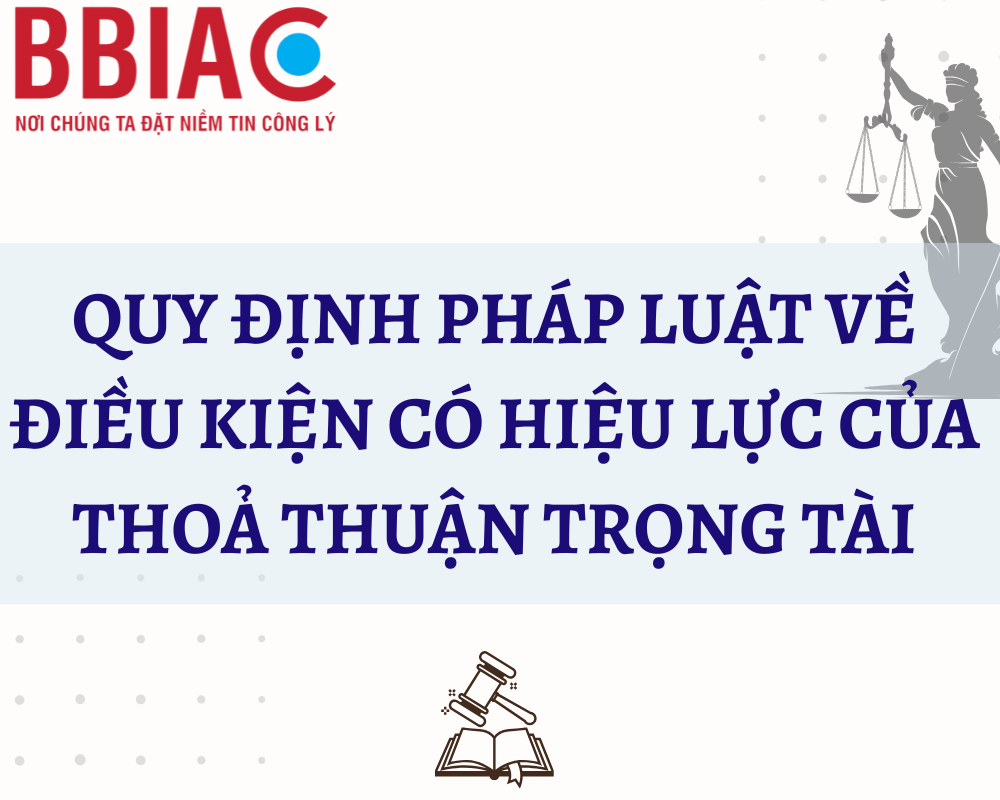Legal provisions on the conditions for the validity of an arbitration agreement

1. On the Validity of the Arbitration Agreement
An arbitration agreement is established on the principle of a presumption of validity, meaning that such an agreement is deemed valid by default. To rebut this presumption, one of the disputing parties bears the burden of proving that the arbitration agreement falls under one of the cases of “invalidity or unenforceability” as prescribed in Article 18 of the Law on Commercial Arbitration (LCA). In the absence of such proof, the arbitration agreement shall be deemed valid as a matter of course.
2. Cases of Invalid Arbitration Agreements
2.1. Invalidity under Clause 1, Article 18 of the Law on Commercial Arbitration (LCA)
The provision on the scope of disputes falling within the jurisdiction of arbitration stipulates:
“Disputes arising in areas that do not fall within the jurisdiction of arbitration as prescribed in Article 2 of this Law.”
An arbitration agreement shall be invalid if the dispute does not fall within the jurisdiction of arbitration, pursuant to Clause 1, Article 18 of the LCA, in reference to Article 2 thereof. Accordingly, a dispute must satisfy one of the following three conditions:
(1) Disputes arising from commercial activities: Commercial activities are defined under Article 3 of the 2005 Law on Commerce. Example: A dispute between two universities cooperating with each other.
(2) Disputes in which at least one party is engaged in commercial activities. Example: A lecturer enters into a consultancy contract with a law firm, in which the parties agree to settle disputes by arbitration. Likewise, a law office or a legal practice organization is still considered to be engaged in commercial activities, as it operates for profit.
(3) Other disputes between parties that are prescribed by law to be settled by arbitration. Attention should be paid to the following specific parties and types of disputes:
- Consumers: They have the right to refuse the arbitration agreement even if they have previously entered into such an agreement (Article 17 of the Law on Commercial Arbitration and Article 4 of Resolution No. 01/2014/NQ-HĐTP).
- Non-contractual disputes (civil disputes): Arbitration procedures may still be applied provided that the law does not prohibit them, in accordance with the principle of freedom of contract under Article 3 of the Civil Code.
- Employees: Individual labor disputes are not resolved under the Law on Commercial Arbitration but are instead subject to the separate procedures of the Labor Arbitration Council (Article 189 of the Labor Code).
- State authorities: When a People’s Committee enters into a construction contract with a foreign contractor and agrees to arbitration, such an arrangement may be considered in accordance with Article 14 of the Law on Investment.
2.2. Invalidity under Clause 2, Article 18 of the Law on Commercial Arbitration (LCA)
Provision on the authority of the person entering into the agreement:
“The person concluding the arbitration agreement lacks authority as prescribed by law.”
An arbitration agreement shall be deemed invalid if the person who entered into it did not have the requisite legal authority. The following instances constitute a lack of authority to conclude an arbitration agreement:
- The person is not the legal representative;
- The person is not a duly authorized representative;
- The person is an authorized representative but has acted beyond the scope of authorization.
- Exception (Principle of Good Faith): If the arbitration agreement was concluded by a person lacking authority, but during the process of formation or performance of the arbitration agreement, or during arbitral proceedings, the person having the authority to conclude the agreement has accepted or been aware of it (Article 3 of Resolution No. 01/2014/NQ-HĐTP), the arbitration agreement shall remain valid. According to the principle of good faith, any objection to such authority must be raised immediately and not deferred until a dispute arises.
2.3. Invalidity under Clause 3, Article 18 of the Law on Commercial Arbitration (LCA)
This provision stipulates that an arbitration agreement shall be invalid where “the person entering into the arbitration agreement does not have civil act capacity as prescribed by the Civil Code.”
According to Article 674(1) of the 2015 Civil Code, a person lacking civil act capacity refers to one who has difficulty in perception and behavior control, a person who has lost civil act capacity, or a person whose civil act capacity is restricted. An arbitration agreement represents the voluntary consensus of the parties; therefore, only a person possessing full civil act capacity can validly and voluntarily express his or her intention.
Pursuant to Clause 3, Article 3 of Resolution No. 01/2014/NQ-HĐTP, “the person entering into the arbitration agreement without civil act capacity” as provided in Clause 3, Article 18 of the LCA refers to a minor, a person who has lost civil act capacity, or a person whose civil act capacity is restricted. In such cases, the court must collect evidence to establish that the person who entered into the arbitration agreement lacked civil act capacity. Such evidence must include documentation proving the person’s date of birth, or an official conclusion or decision by a competent authority or a court declaring that the person has lost or has been restricted in civil act capacity.
2.4. Invalidity under Clause 4, Article 18 of the Law on Commercial Arbitration (LCA)
The arbitration agreement shall be invalid where “the form of the arbitration agreement does not comply with the provisions of Article 16 of this Law.”
Accordingly, the forms in which an arbitration agreement is concluded must conform to and comply with the requirements set forth in Article 16 of this Law. If the agreement is not established in a legally valid written form, it fails to meet the mandatory formal requirements prescribed by law, thereby rendering the arbitration agreement invalid.
2.5. Invalidity under Clause 5, Article 18 of the Law on Commercial Arbitration (LCA)
This provision stipulates that an arbitration agreement shall be invalid where “one of the parties was deceived, threatened, or coerced during the conclusion of the arbitration agreement and requests that the agreement be declared invalid.”
Acts of deception, threat, or coercion are grounds for declaring a civil transaction invalid under Article 127 of the 2015 Civil Code. Accordingly, when it is established that one of the parties was subject to deception, threat, or coercion in the process of concluding the arbitration agreement, and such party requests that the agreement be declared invalid, the arbitration agreement shall be deemed invalid pursuant to Clause 5 of this Article.
2.6. Invalidity under Clause 6, Article 18 of the Law on Commercial Arbitration (LCA)
This provision stipulates that an arbitration agreement shall be invalid where “the arbitration agreement violates a prohibition of law.”
Such cases refer to arbitration agreements that provide for the resolution of disputes falling within areas that are not permitted to be settled by arbitration under the law.
3. Mechanisms for Resolving Disputes through the BigBoss International Arbitration Center (BBIAC)
To resolve a dispute through commercial arbitration at BBIAC, clients may insert one of the following two clauses into their contracts:
3.1. Model Arbitration Clause
“Any dispute arising out of or in connection with this contract shall be settled by arbitration at the BIGBOSS International Commercial Arbitration Center (BBIAC) in accordance with the Arbitration Rules of Procedure of this Center.”
Additionally, the parties may supplement the clause with:
(a) The number of arbitrators shall be [one or three].
(b) The seat of arbitration shall be [city and/or country].
(c) The governing law of the contract shall be [ ].*
(d) The language of the arbitration shall be [ ].**
Notes:
* Applicable only to disputes involving a foreign element.
** Applicable only to disputes involving a foreign element or disputes where at least one party is an enterprise with foreign invested capital.
3.2. Model Arbitration Clause Applicable to Expedited Procedure
“Any dispute arising out of or in connection with this contract shall be settled by arbitration at the BIGBOSS International Commercial Arbitration Center (BBIAC) in accordance with the Arbitration Rules of Procedure of this Center. The Parties agree that the arbitration proceedings shall be conducted under the Expedited Procedure stipulated in Article 37 of the BBIAC Arbitration Rules of Procedure.”
Additionally, the parties may supplement the clause with:
(a) The seat of arbitration shall be [city and/or country].
(b) The governing law of the contract shall be [ ].*
(c) The language of the arbitration shall be [ ].**
Notes:
* Applicable only to disputes involving a foreign element.
** Applicable only to disputes involving a foreign element or disputes where at least one party is an enterprise with foreign invested capital.
Contact 0979 133 955 for consultation!
